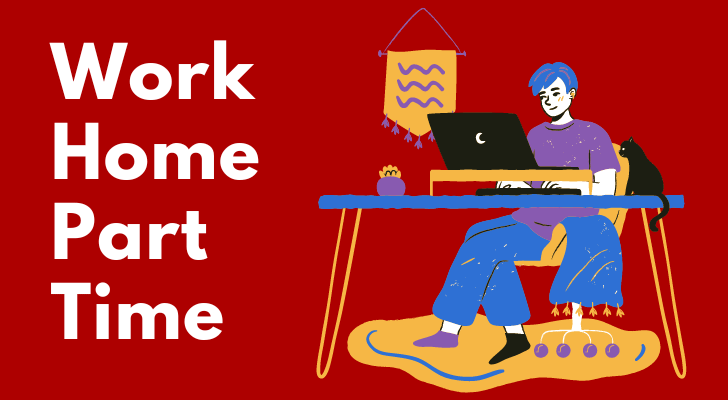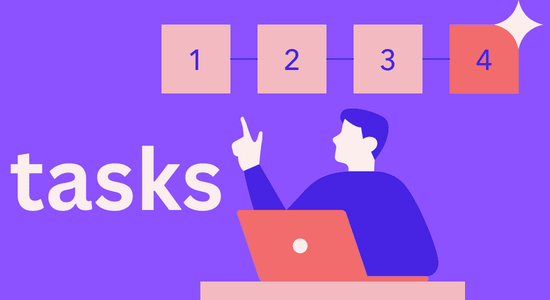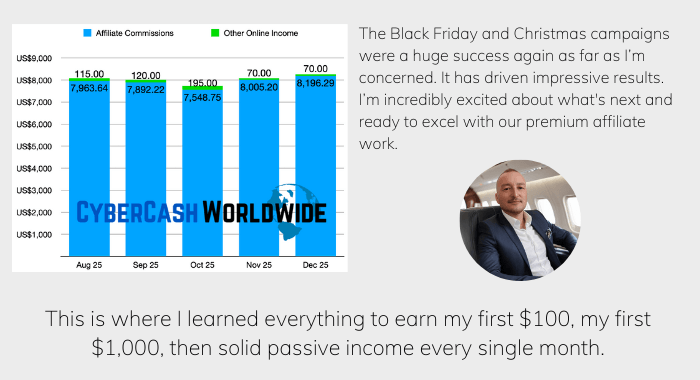I'm getting old. Working from home was once a dream job, I got it, I've been doing it, and I'm happy with what I'm doing. But I do get overwhelmed more often that I used to. It's the capacity that I seem to have less and less as I age.
Working on a new business venture can be both exciting and overwhelming, especially if you are doing it part-time from home. As an entrepreneur, you often feel the pressure to juggle multiple tasks and make the most of your limited resources in order to grow your business. But how do you do that?
This post was originally published in 2016 and I thought the content was fabulous at the time. Now at least a thousand bloggers are saying the same things. I've re-written it - is it better or still a bucket of vomit? Care to read on?

#1 Ditch Online Communities
Let's be real, online communities, especially those focused on business, often promise more than they deliver. They lure you in with the promise of networking, valuable insights, and shared experiences. Sounds great, right? But once you're in, it's a whole different ball game.
The Noise Level is High
You'd think that a community full of like-minded people would be a goldmine for quality advice. Yet, most of what you get are self-promotion posts, upsells, and a parade of "gurus" who know less about your industry than your grandma. They're not there to help; they're there to sell. Let's not kid ourselves, we've all fallen for the "Let me DM you some free tips" line, only to be pitched a $999 course on "How to 10x Your Revenue."
Time Drain
Scrolling through endless threads and reading through poorly written "guides" that promise business success isn't just uninspiring; it's a downright waste of time. You've got a business to run, orders to fulfill, and maybe even a family to spend time with. The more time you spend aimlessly trudging through these communities, the less time you have for what really moves the needle for your business. Time is money, as they say.
Repetitive, Not Progressive
Often these communities can be where everyone is repeating the same tired advice. If everyone is agreeing on everything, then how are you supposed to grow and innovate? Real learning often comes from differing viewpoints, from challenges to the status quo. You're not getting a lot of that in a community where the majority are out for their self-interests.
Sifting Through the Junk
Here's the thing, even if there's good advice in there, you have to sift through so much fluff and filler to get to it. We're talking hours that could be better spent elsewhere. The Signal-to-Noise ratio in these online communities is generally so out of whack that finding a meaningful dialogue becomes like searching for a needle in a haystack.
A Sense of False Security
Being part of a community often gives us a false sense of progress. "I'm networking," you might think, but what you're really doing is talking to Bob from Idaho about how to optimize Instagram hashtags. Not saying Bob doesn't know his hashtags, but is this really going to give your business the boost it needs?
So yeah, ditching these online communities frees you from the noise, the time-wasting, the echo chamber, the junk, and the false sense of progress. It lets you reclaim your time and focus on what's genuinely beneficial for your business. Because at the end of the day, running a successful home business is about doing the work, not just talking about it, wouldn't you agree?
#2 Avoid Meetings
So you get an invite for another meeting to discuss "strategy" or "synergy" or some other buzzword, and you're tempted to hit "Accept" just out of habit. We've all been there, right? The prevailing culture suggests that meetings equal productivity and collaboration. Well, let me tell you, that's often not the case.
Time is Your Most Precious Resource
Meetings, especially those without a clear agenda or purpose, are notorious time-suckers. You walk in (or log in) thinking it'll be a quick 30-minute chat, and before you know it, an hour or more has vanished. Poof! Gone! Time you could have spent on actually advancing your business has been lost to unproductive chatter.
Delusional "Face Time"
There's this misconception that showing up for meetings—whether they're virtual or in-person—means you're more engaged or dedicated. That's baloney. You're not proving anything except that you're willing to sacrifice valuable time for something that could likely be summed up in an email or quick phone call. The real dedication is shown through results and meaningful interactions, not nodding along in a meeting that's going nowhere fast.
The Energy Drain
Let's not overlook the mental and emotional energy these meetings can drain out of you. Preparing for them, attending them, and then the post-meeting debrief—it's all taxing. By the time you're done, you're often too exhausted to focus on tasks that actually matter. It's counterintuitive, don't you think?
Opportunity Costs
By saying yes to meetings that don't directly benefit you or your business, you're saying no to other activities that could. Maybe it's a deep work session to tackle a big project. Maybe it's some one-on-one time with a valued customer. Or heck, maybe it's just some quality downtime to recharge so you can be your best entrepreneurial self.
By limiting meetings to only the ones you really feel you need to attend, you’re doing more than just saving time—you’re giving yourself the freedom to use that time in ways that are genuinely productive and fulfilling. So next time that meeting invite comes in, maybe hit "Decline" and reclaim your day. Sound like a plan?
#3 Set Aside Time for Yourself
This can be difficult to do if you are a single parent, if you have a family or other obligations, but it's important to make time for yourself.
- Try to set regular hours for working. This will help you create a schedule and stick to it.
- Take breaks during the day. Get up and move around, even if it's just for a few minutes. This will help you stay focused and avoid burnout.
- Make sure you have some downtime each day. This can be used for anything from reading or taking a walk to simply relaxing. It's important to have time when you're not working so that you can recharge and come back refreshed.
- Try to get out of the house at least once a day. If possible, take a walk or visit a nearby park. Getting some fresh air can help clear your head and give you energy.
- Don't forget to schedule some fun! Make sure you have time each week to do something that you enjoy. This will help reduce stress and keep you motivated.
#4 Give Up Social Media
I'm not saying give up completely. Perhaps you can focus on one network? Spreading yourself thin across several social media platforms not only eats up your precious time but also exposes you to the darker elements that can be rife on these networks. Negative users, trolls, and spammers become much harder to manage when you're juggling multiple accounts.
Negativity, Trolls, and Spammers Multiply
The more platforms you're on, the more you open yourself up to online toxicity. One negative comment can already throw off your focus. Imagine having to deal with a barrage of them across different platforms? It's just not worth the mental energy. Sticking to one network makes it easier to maintain a controlled, positive environment for your brand and your mental health.
Time Management Gets Tricky
Managing one social media platform can already feel like a full-time job sometimes, especially when you have to weed out spam or respond to less-than-pleasant comments. Handling multiple accounts just multiplies the time you spend doing this unproductive work. You could spend that time improving your products, services, or just taking a breather, right?
The Stress of Constant Alerts
We've all been there — you're in the middle of something important, and then your phone buzzes with a social media notification. When you're dealing with multiple platforms, those buzzes can become a constant interruption. It’s stress you don’t need.
The Benefit of Single-Platform Mastery
Focusing your energy on one platform allows you to master its intricacies and use it to your advantage. It's much easier to build a strong, genuine following when you can dedicate your time and resources to one place. The result? A more engaged following, fewer trolls, and a lot less spam to deal with.
#5 Keep a Schedule
When you're at home, it can be tempting to let work slide in favor of other activities. But if you want to be productive, it's important to set aside specific times for work and stick to them.
Think about what time of day you're most productive and try to block out a few hours during that time for work. If possible, avoid working in the evening or late at night when you're more likely to get distracted by family or other obligations.
If you have trouble sticking to a schedule, try setting alarms or using a timer to help keep yourself on track. And don't be afraid to ask for help from your family or roommates if you need it.
Scheduling Your Time
Your priority is to update your website - writing your blog, or create a video blog, creating affiliate links and publishing it.
But (a) you don't have much free time and (b) there are many distracting factors. So it's important to schedule your tasks throughout the day, and you may want to change your routine, too.
For example, when I was working as an accountant, starting an online business was a real struggle. I only had 2 hours maximum of free time a day at home. My partner was watching a TV loud the whole evening - quite rightly. And we had a dog and a cat. There was no way I could concentrate in the evening. I started to go to bed at 7:30 pm, got up at 2:00 - 2:30 am to work online. Still the pets got up early and needed attention, but at least I was able to use the very early hours for my new online business.
I'm a "morning person" therefore it worked for me that way. My mind is clearer in the morning, and I would be less focused in the evening and waste a lot of time writing low-quality content. But if you are a night owl, you may find it the other way around.
Scheduling Your Tasks By Type
There are 4 types of tasks to do, and you can allocate your time to each type according to your daily schedule. The 4 types are;
- Preparation for your post (article, YouTube video)
- Creation (writing the article, creating the video, resizing and pasting images)
- Promotion and social media engagement
- Engagement with others and learning (read useful articles, post comments, learn new techniques)
The actual creation of your work may be the most important element, but without researching the products or niche, obviously you can't write about them. You have to promote your work so that it will reach as many people. And you need to learn new skills to improve the quality of your work.
I'm sure you'll agree that by time-allocating each element throughout the day, you can work through efficiently. What I used to do when I had a full-time job was to;
- Read useful articles and post comments while commuting.
- Social engagement during the lunch break. I would schedule-post using Hootsuite to Twitter.
- Research my niche before dinner.
- Bookmark any useful articles before going to bed (read them the following morning while commuting)
- And start writing my article early in the morning.
#6 Manage Your Time Wisely
Managing your time wisely means creating a schedule and sticking to it as much as possible. Of course, there will be times when things come up and you have to deviate from your schedule, but try to stick to it as much as possible.
Create a daily or weekly To Do list
Write down everything you need to get done in a day or week, and then work on checking items off the list. This will help you stay focused and on track.
Batch similar tasks together
For example, if you need to make some phone calls for work, batch them all together instead of making them throughout the day. This will help you use your time more efficiently.

#7 Avoid Distractors!
Surfing the net, watching trashy TV programs, playing games and chatting on the phone are all distractors. You need as much "work home" time as needed, so stay away from the distractors as much as you can.
Did you use to have to declutter your entire bedroom just before the college exam? (Or was it just me?)
If you are like me, that personality needs to be managed too. I need to submit work to my client by Monday first thing in the morning. And all of a sudden I can't concentrate unless I clear my wardrobe and decide which clothes to donate to a local charity shop.
I decided to schedule the time for decluttering as well (yes, seriously. don't laugh!) I could do these things while watching TV with my partner.
By all means, it's essential to have your work-from-home environment as comfortable as possible so that you can only focus on your job.
#8 Powernap
Napping has a bad rap. Many people see it as a sign of laziness or a lack of ambition. But let's dispel that myth right now: a well-timed, short nap can work wonders for your mental sharpness and energy levels. We're not talking about crashing on the couch for three hours; this is about the power nap, ideally lasting just 20 minutes.
The Science Behind It
When you take a brief nap, you enter into light sleep without diving deep into the REM cycle. This helps in multiple ways:
- Restores Alertness: A power nap can give you that kickstart when you're feeling sluggish. Think of it as a system reboot for your brain.
- Improves Mood: Sleep impacts hormone levels. Even a brief nap can adjust your hormones enough to boost your mood.
Choose the right time for your power nap to make the most of it. Early to mid-afternoon, around 2 p.m. or 3 p.m., is generally ideal. Napping too late in the day can interfere with your ability to fall asleep at night, and we don't want that, do we?
Setting Up for Success
If you can, create a nap-friendly environment. A quiet room and a comfortable chair or couch are ideal. Set an alarm for 20-25 minutes to ensure you don't oversleep and wake up groggy.
The Caffeine Hack
Believe it or not, drinking a cup of coffee right before your nap can amplify the benefits. It sounds counterintuitive, but it takes about 20 minutes for caffeine to kick in. So, by the time you're waking up, not only are you refreshed from the nap, but you're also getting that caffeine boost.
The Limits of the Power Nap
Don't get me wrong; napping is not a substitute for a good night's sleep. If you find yourself needing multiple power naps throughout the day, it might be a sign that you need to evaluate your overall sleep habits. It's a stopgap measure, not a long-term solution.
Don't Overdo It
If you nap for too long and enter the deeper stages of sleep, you may experience what's known as sleep inertia, a state of grogginess and disorientation. That definitely defeats the purpose of trying to be more alert and focused, doesn't it?
So, the next time you hit that midday slump, don't reach for another cup of coffee or an energy drink. Consider taking a quick, refreshing power nap to recharge your batteries and get back in the game. It's a real game-changer.
#9 Keep A Healthy Lifestyle
I am a keen runner and vegetarian - that doesn't necessarily I'm healthy. Too much exercise often exhausts me (the good thing about working from home is I can have a nap any time of the day!). I stuff myself with junk food, and that's not good either.
When you're grinding away at a home business, it's easy to neglect your health. You might think that the more hours you put in, the more you'll get done. But let's be real: what good are those extra hours if you're operating at half-capacity?
The Brain-Body Connection
Keeping your body in shape has direct benefits for your mind. Exercise pumps blood to the brain, which helps you think more clearly. A balanced diet ensures you're getting the nutrients needed for cognitive function. And let's not forget that a well-fed body is less prone to illness, which means fewer unplanned days off, right?
You don't just exercise to lose weight or build muscles, but you know that physical exercise will create a mental environment where you can thrive. Even a simple 20-minute walk can clear your mind, relieve stress, and boost your mood. And that's the kind of headspace you need when you're making important business decisions.
Food Choices and Hydration
It's tempting to go for fast food or skip meals altogether when you're in the zone, but poor nutrition can be a productivity killer. Your brain runs on glucose, and when you're not feeding it properly, you're bound to crash. Eating balanced meals filled with lean protein, whole grains, and plenty of fruits and vegetables can keep you fueled and focused all day.
And of course, dehydration can lead to a nasty cycle of fatigue, poor concentration, and low energy levels. Keeping a water bottle at your workstation is a simple way to remind yourself to stay hydrated throughout the day.

#10 Prioritize Your Tasks
When you work from home, it can be easy to get caught up in household chores or other distractions. To stay on track, it's important to prioritize your tasks and make sure you're spending your time wisely.
Start by making a list of everything you need to do in a day. Then, rank your tasks in order of importance. Make sure to include both work-related and personal items on your list.
Once you have your list, take a look at your daily schedule and see where you can fit in each task. If you have some flexibility, try to group similar tasks together so that you can work on them more efficiently.
And don't forget to leave some time for breaks! Working from home can be isolating, so it's important to take a few minutes here and there to stretch your legs, grab a snack, or just step away from your desk.
#11 Don't Multitask
So you're juggling emails, customer calls, and updating your website—all at the same time. You feel like a productivity ninja, right? Sorry to burst your bubble, but multitasking is a surefire way to mess things up.
Cognitive Bandwidth Isn't Infinite
You've got a finite amount of mental energy. When you're multitasking, you're basically spreading that limited cognitive bandwidth across multiple tasks. The result? None of the tasks gets the full attention or quality it deserves. It's like trying to fill multiple cups with a single stream of water; they all end up half-empty.
The Switching Cost
Every time you switch between tasks, your brain needs to adjust. You might think you're smoothly sailing from one task to another, but your brain is scrambling to catch up. It takes time and energy to refocus, and all those seconds add up. It's like revving a car engine every time you switch gears—wasteful and hard on the system.
A Breeding Ground for Errors
Trying to manage multiple tasks simultaneously increases the chances of messing something up. Maybe you send an email to the wrong person because you were too busy fielding a call. Perhaps you miss out on a crucial detail in a project because your attention was split. The more you multitask, the higher the risk of errors, plain and simple.
Killing Depth and Creativity
Deep work—where you dive into a task and lose yourself in it—is where the magic happens. It's when you come up with your most creative ideas and solutions. Multitasking robs you of the opportunity to dig deep. You end up skimming the surface on everything but mastering none.
Stress, Stress, and More Stress
Juggling multiple tasks might make you feel like you're accomplishing a lot, but it's often just an illusion. And the stress? Sky-high. Multitasking keeps you in a perpetual state of high alert, making it hard to unwind or enjoy a sense of genuine accomplishment.
So, think twice before you dive into multitasking. Doing one thing at a time—and doing it well—beats being a Jack of all tasks but master of none, wouldn't you agree?
Juggling your day job and your part-time work at home can be easier with good motivation and your organising skill. Create a plan now, take action, and be persistent to be a successful internet marketer! Always be positive.
#12 Gamify Your Day
Turning your day into a game might sound childish, but don't knock it till you've tried it. Gamification—basically, applying elements of game playing to other activities—can genuinely boost motivation and productivity. I mean, if something is fun, you're more likely to do it, right?
The Rationale Behind the Point System
Assigning points to tasks creates a tangible way to measure your day's accomplishments. Maybe answering an email is 1 point, finishing a report is 5 points, and landing a new client is a whopping 20 points. You end up with a "score" at the end of the day that provides a snapshot of your productivity.
The Competitive Edge: Trying to beat your own high score adds a layer of competition—even if it's just against yourself. That's motivating, and not just in the moment. You'll find that you're always on the lookout for ways to rack up those points.
Flexibility and Adaptability: Some days, you might focus on lots of small tasks, racking up points quickly. Other days, you'll tackle the big stuff for more points per task. The point system adapts to your needs and mood, making it versatile.
Prioritizing Like a Pro: When you've got a point system in place, you're less likely to keep pushing aside difficult or time-consuming tasks. After all, those are your high-point opportunities! You'll naturally prioritize them to boost your daily score.
Timed Challenges Are Good
We all have tasks we're not excited about. It's just a part of life. However, putting off these tasks can create stress and reduce overall productivity. Enter timed challenges.
Beat the Clock: Setting a timer creates a sense of urgency. You'd be surprised how much faster you can work when you're racing against the clock.
Small Bites, Less Dread: For those daunting tasks, you can even break them into smaller chunks and set a timer for each. Racing to complete each chunk not only makes the task less intimidating but also infuses a sense of fun into it.
High Intensity, Short Bursts: This approach is quite similar to the concept of high-intensity interval training in workouts. Short, focused bursts of work are often more productive than long, drawn-out periods. You're less likely to get bored or tired, which means you maintain higher quality throughout.
Immediate Gratification: Once the timer goes off and you've beaten the challenge, the sense of accomplishment is instant. That's a fast and powerful motivational boost, one that will carry you through other tasks.
Self-Knowledge: After a few timed challenges, you'll start to get a real sense of how long tasks actually take you. This is gold when it comes to planning and allocating your time for future tasks.
So, if you're looking to keep your motivation high and make your day a little more exciting, turning it into a game with points and timed challenges is not a bad strategy at all. Sure, it's not traditional, but who wants to be traditional when you can be productive and have a little fun, too?
If you never give up, something will happen. Remember that!




